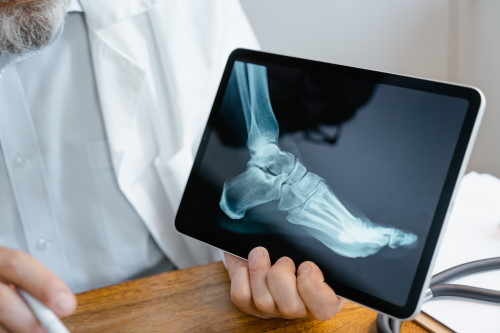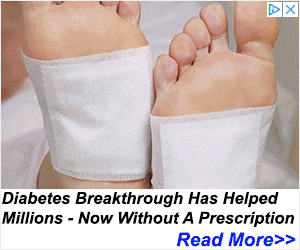Because it's never too early, or too late, to start taking care of your bone health.
The Office of Disease Prevention and Health Promotion reports that approximately 10 million people in the United States have osteoporosis, and an additional 43 million have low bone mass and are at risk of developing osteoporosis. Of this 53 million, most are women.
BREAKING: This Keeps Your Blood Sugar Below 100 - Even When You're Eating Sweets!
But bone health isn’t limited to osteoporosis, and rickets, stress fractures, osteonecrosis, osteogenesis and bone cancer can happen at any age. Some conditions affecting the health of our bones are present from birth, while others occur later as a result of illness, vitamin and mineral deficiencies and lifestyle choices.
“We know that aging is associated with decreased bone mineral density in females and males, especially in females after they go through menopause,” explains Liz Joy, MD, MPH, FACSM, FAMSSM, medical director of wellness and nutrition at Intermountain Health in Salt Lake City, UT. “Talk to your doctor about your risks for poor bone health and get your bone density checked if recommended,” Dr. Joy says. “A DEXA scan can inform as to the need for treatment.”
Regardless of where you started or where you are now, there are some things you can incorporate into your daily life to improve your bone health. Doctors gave us four habits to promote long-term bone health at any age.
Make deposits in your bone bank
Our bodies don’t produce calcium, so we need to get calcium and vitamin D through food and supplements. The Recommended Dietary Allowance (RDA) of calcium varies by age, but is about 1300 mg of calcium daily. “That’s about four servings a day of dairy,” Dr. Joy says. “A glass of milk at each meal and a serving of yogurt or a two-ounce slice of cheese.”
Emma Laing, PhD, RDN, director of dietetics at the University of Georgia and a national spokesperson for the Academy of Nutrition and Dietetics, points out that calcium-fortified soy milk, soybeans, dark green leafy vegetables, and fish (like salmon, mackerel, tuna and sardines) are all good sources of calcium.
The recommended amount of vitamin D is 400 IU (international units) for pediatric age groups and 600 to 800 IU for adults. “Vitamin D can be obtained from sunlight exposure and food sources such as fatty fish, eggs, and fortified dairy products,” offers Grant Radermacher, DC, owner of Ascent Chiropractic in Wisconsin.
“If it’s a struggle for you to obtain the recommended amounts of these nutrients from food alone, you might need to take a multivitamin or a specific type of dietary supplement,” Dr. Laing says, “The two types of vitamin D supplements—vitamin D2 and vitamin D3—and both are beneficial for bone health. To figure out how much calcium or vitamin D you might need from a supplement, consult your healthcare provider or registered dietitian.”
Dr. Radermacher also recommends Vitamin K and magnesium for bone health. “Vitamin K can be found in green leafy vegetables, and you can get magnesium in nuts, seeds, and whole grains,” he says. If you struggle to meet the RDA of these bone-essential nutrients in your regular diet, you can take supplements. “For adults, it’s recommended to get 100 mcg of vitamin K2 and 350 mg of magnesium,” Dr. Radermacher says.
Exercise regularly
“Regular exercise, especially weight-bearing activities like walking, jogging, dancing and tennis, can help keep bones strong,” Dr. Radermacher says, “Weight training and resistance exercise can also help increase bone density.”
The National Institutes of Health tells us that weight-bearing exercises “improve endurance, balance, coordination, and improve overall health.” To build bone mass, do weight-bearing exercises for 30 to 45 minutes at least four times a week.
“Bone responds to a load by building more bone,” Dr. Joy says. “So, runners and soccer players typically have denser bones than swimmers and cyclists. But the overarching message is to be active throughout your life.”
Dr. Joy also points out that regular physical activity is associated with a lower risk of falls and subsequent fractures, which is a growing concern as we age.
Consider lifestyle factors
Tobacco and alcohol both reduce bone mineral density, so consider that when indulging in these substances. In addition, high-sodium foods and drinks containing caffeine (such as coffee, tea and soft drinks) can weaken bones.
TRENDING: Big Pharma In Outrage Over This Breakthrough Natural Painkiller
“Adults should stick to national guidelines for alcohol consumption, which indicate two drinks or less in a day for men or one drink or less in a day for women,” Dr. Laing says. The Centers for Disease Control and Prevention (CDC) reminds us that a serving of alcohol is 12 ounces of beer (5% alcohol content), 8 ounces of malt liquor (7% alcohol content), 5 ounces of wine (12% alcohol content) or 1.5 ounces of 80-proof (40% alcohol content) distilled spirits or liquor (such as gin, rum, vodka, whiskey).
Pick your parents well
OK, we all know you can’t pick your parents, but you can consider the health of your parents and grandparents and make adjustments to your life based on the illnesses that impacted their lives. “Much of our bone health is determined by our genetics,” Dr. Joy says, “So if you know your parents and grandparents had or have conditions such as osteoporosis, make sure you check in with your primary care provider regarding your bone health.”









